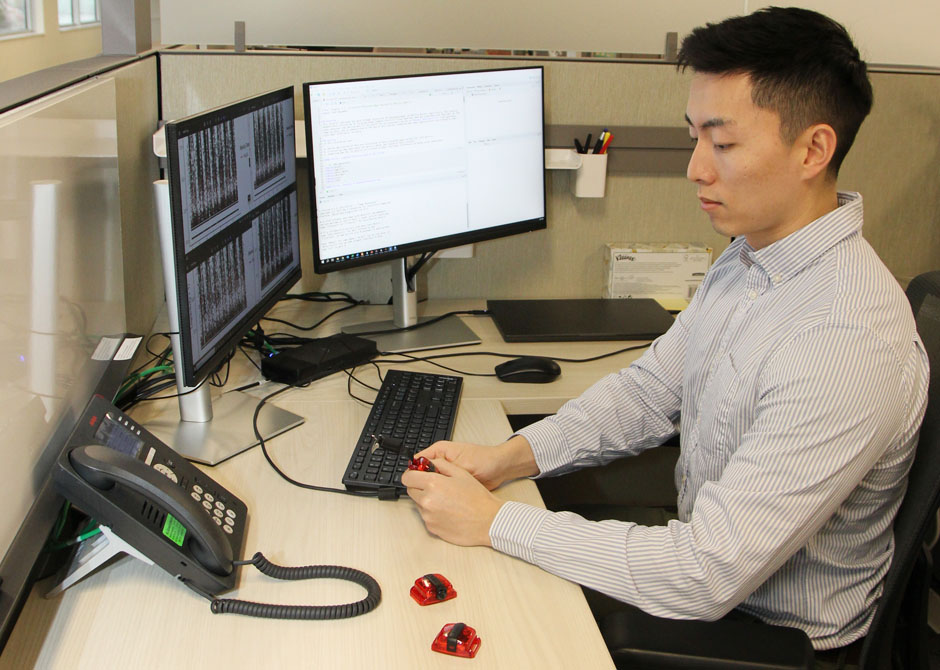Rehabilitation and Participation Science
Program in Occupational Therapy
by Stephanie Stemmler • April 01, 2024

Lau downloads data from the actigraph in his Sleep, Mood and Cognition Laboratory.
Stephen Lau, PhD, wants to harness the power of sleep to improve stroke rehabilitation. Lau, the head of the Program in Occupational Therapy’s new Sleep, Mood and Cognition Laboratory, is looking for evidence-based behavioral interventions that improve stroke patients’ participation in daily living activities by studying the relationship between sleep disturbances and mood impairment on rehabilitative outcomes.
“Sleep apnea is one of the biggest risk factors for stroke, but stroke itself can produce widespread changes in how our brain works including changes in sleep,” Lau notes. “Over 70% of stroke survivors complain about sleep disturbance. Sleep changes can take a toll and have a negative effect on rehabilitation.”
In fact, Lau says that sleep problems not only can hinder recovery, they also can increase the likelihood for stroke recurrence. “As occupational therapists, we are focused primarily on helping individuals return to independent daily activities and participation in their communities,” Lau adds. “But we haven’t delved that deeply into nighttime sleep that is the foundation for our daytime behavior and mood regulation.”
Lau was pursuing his degree in occupational therapy in Hong Kong when he says he had an “a-ha moment” while working with patients. “I saw firsthand that we needed to improve the assessment tools, which had been in place for a long time,” he recalls. “Even though more than 90% of my peers in Hong Kong went straight into clinical or hospital practice, I wanted to advance the field. Research was a way I could do that.”
His professor, Chetwyn Chan, PhD, a distinguished leader and pioneer in rehabilitative science in Hong Kong, told Lau that as a clinician scientist in an academic institution, Lau could contribute to society, help patients, train future occupational therapists and advance the profession; in other words, it was an opportunity to make a larger contribution.
“He dared me to dream, and it was like a switch, a lightbulb moment,” Lau says. “I worked as his research assistant in the Applied Cognitive Neuroscience Laboratory after I graduated and then applied to Washington University as a doctoral candidate so that I could immerse myself in research in the United States.”
He studied here under the mentorship of former Program in Occupational Therapy director Carolyn Baum, PhD, OTR, FAOTA. As he discussed research opportunities with her, Lau again saw in the clinics what he experienced in Hong Kong. “Stroke patients were talking about not sleeping well at night and they were trying NyQuil, alcohol or just lying in bed trying to focus on sleep,” he says. “Lack of sleep had a large impact on their ability to progress through rehabilitation. I wanted to know how to change that.”
After earning his doctorate, he completed a one-year postdoctoral fellowship in sleep medicine and complex intervention in the School of Health and Rehabilitative Sciences at the University of Pittsburgh. Last year, he returned to St. Louis and Washington University to establish his own lab. “Stroke rehabilitation is a large focus area at Washington University and it’s exciting to be here at a time when the University has just dedicated the Jeffrey T. Fort Neuroscience Research Building. It’s one of the world’s largest research centers focusing on collaborations in the neurosciences, including stroke research.”
Lau is now working on an R03 grant application to fund sleep research. The study will determine the feasibility of a stroke-specific intervention to improve poststroke insomnia around the clock by improving sleep behaviors at night and reducing sedentariness in the daytime. He plans to use mobile health technologies such as actigraphy, which involves a wearable monitor to track rest and activity rhythms. As part of his role in the Program, he also will bring in OTD and PhD students so that they learn how to design a study, submit a proposal and conduct research, and then publish data to benefit the wider occupational therapy field.
“Most sleep interventions are designed for the general population,” Lau says. “Stroke patients have additional challenges. For example, many have highly sedentary lifestyles that are independent of their functional capacity. We need to identify nighttime strategies and sleep educational tools that can motivate more active lifestyles in the daytime, which then will prompt a renewed cycle that improves sleep at night.”
The Centers for Disease Control and Prevention notes that one in three adults in this country experiences sleep deprivation. For his own life, Lau practices what he preaches. He sets a time limit on social media use, works out regularly and is careful to get a minimum of seven hours of good sleep each night. While he’s focused on improving outcomes for stroke patients who have difficulty sleeping, he says his research could have broad implications over time.
“We all need to sleep, right?” he says. “We should be asking ourselves, are we sleeping well? And if not, what can we do about it? That’s the evidence and strategies I want to provide.”
We welcome inquiries from prospective students, potential collaborators, community partners, alumni and others who want to connect with us. Please complete the form below to begin the conversation.
Schedule an Info Session
We are excited that you are considering applying to the Program in Occupational Therapy at Washington University. Please join us for a Zoom Information Session for either our entry-level MSOT or OTD degrees or our online Post-Professional OTD. Current faculty members will discuss the degree program and answer any question you may have. We are offering these sessions on the following days and times. The content is the same for each one, so you only need to sign up for one.
Upcoming ENTRY-LEVEL Degree ZOOM Info sessions:
Schedule an Entry-Level Info Session
Upcoming PP-OTD Degree ZOOM Info session: